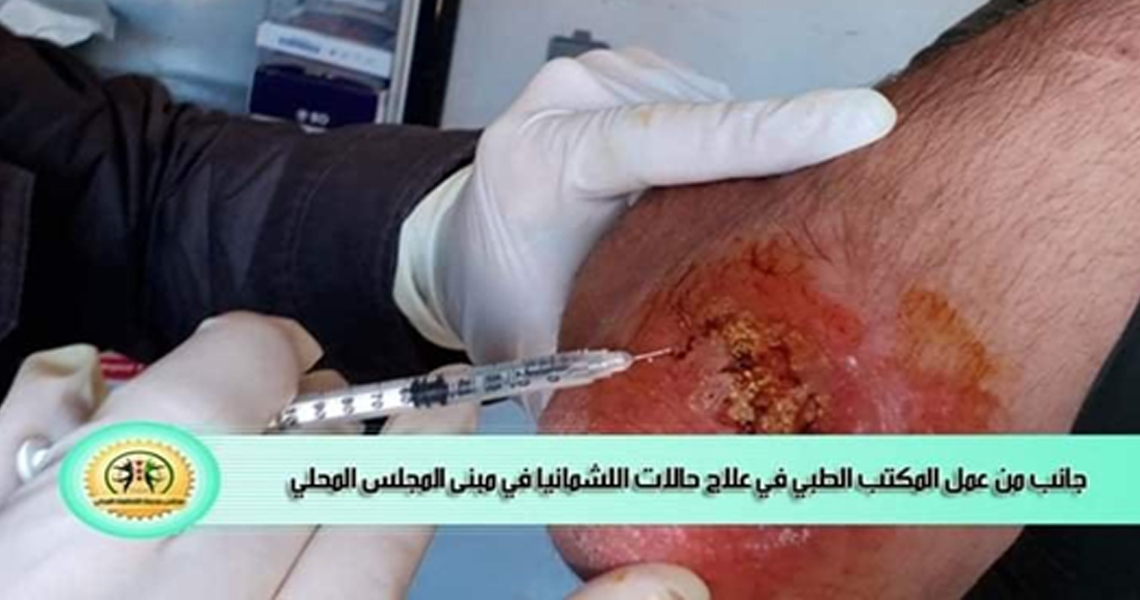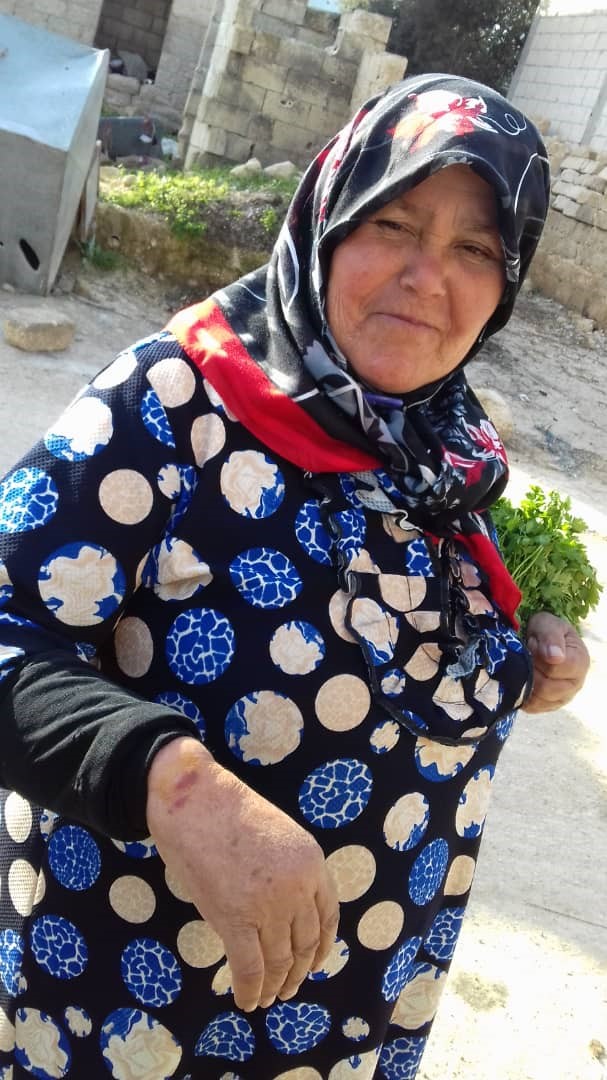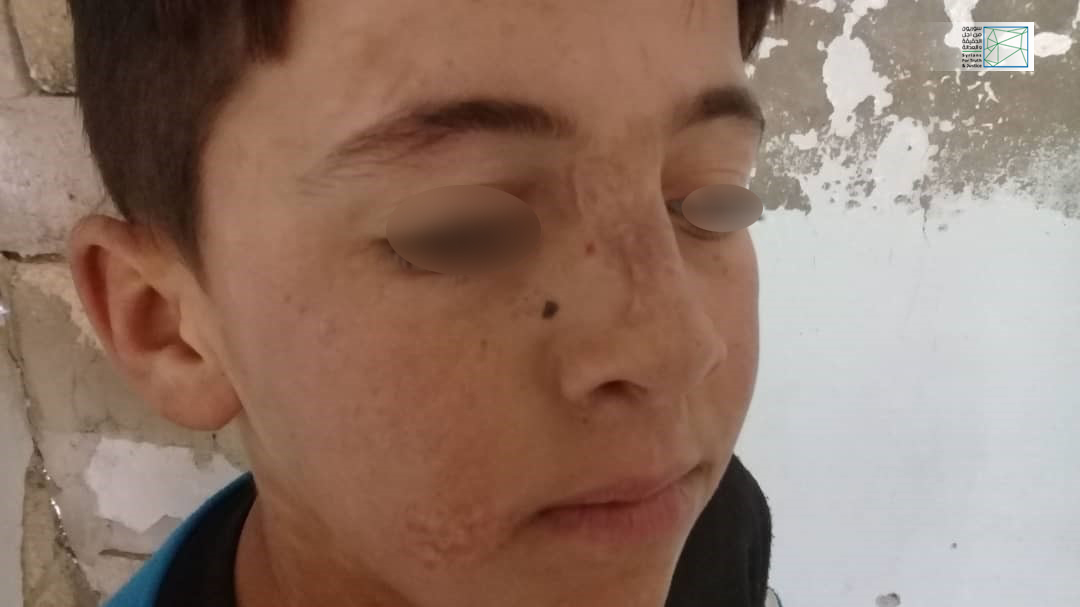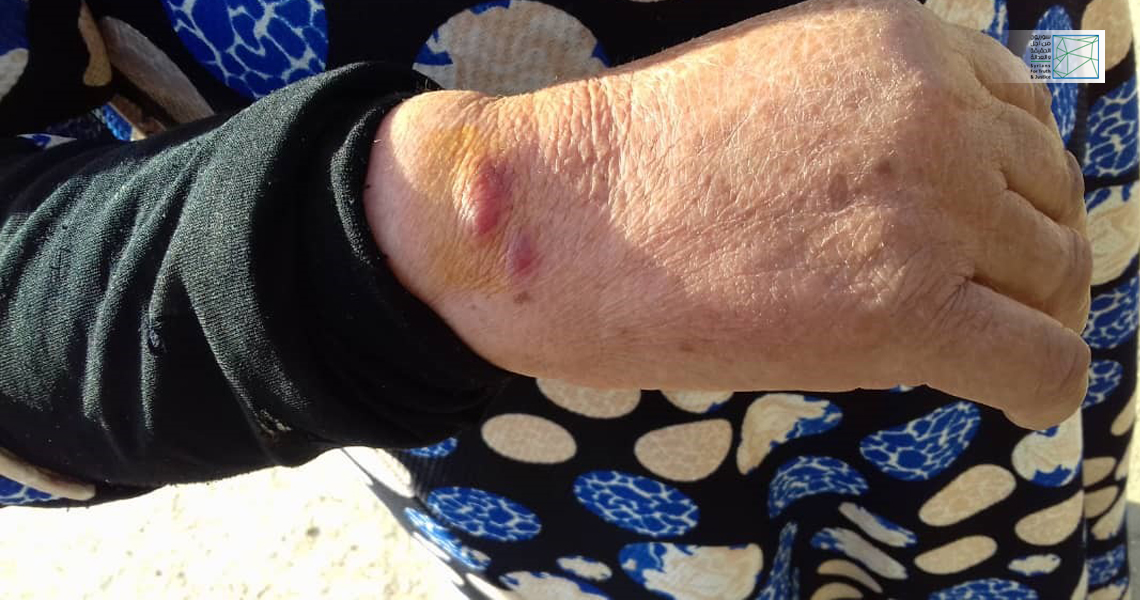Introduction The cutaneous leishmania[1], or leishmaniasis, threatens the residents of al-Lataminah city, particularly the vulnerable children. Up to 600 leishmania cases were reported in al-Lataminah alone between October 2018 and February 10, 2019.
According to the medical office in the city, 300 cases a month have been recorded since people returned home, notably after announcing a buffer zone[2] and a relative lull in the city.
Testimonies obtained by STJ said the accumulation of garbage and cracks in drainage pipes in al-Lataminah led to the spread of leishmania and other diseases in the city. The absence of medical posts in the city worsened the situations. Most of the city's hospitals are out of service[3] because the Syrian army and its allies bombarded them in the last few years.
The medical office based in the local council, though ill-equipped, is the sole medical point in al-Lataminah that offers treatment for this epidemic.
Air strikes and ground attacks pounded al-Lataminah the most in the past few years, which doubled the suffering of its people, as 8.000 of them are threatened to be affected with leishmania.
al-Lataminah being, controlled by the armed opposition group Jaish al-Izza[4], is a contact line with the Syrian army-controlled areas, including Halfaya, Tyba al-Imam, and Mahardah. In 2014, the majority of the population fled the continuous bombardment, while very few preferred to remain in the city as they could not afford displacement in the camps alongside the Syria-Turkey borders. Hospitals, schools and medical centers in al-Lataminah are destroyed and the sanitation system is also considerably damaged.
- At least 5,000 people affected with leishmania in northern and western Hama
Leishmania is prevalent in Hama, especially in al-Lataminah, due to poor services. Dr. Alaa Mohammed al-Ali, the head of the al-Lataminah medical office, explained why leishmania thrived and what is needed to combat it. He described the collapsed services system in the city, especially after many residents returned:
"Since early 2018, estimated 5,000 people have been affected with cutaneous leishmania. There were also many cases of visceral[5], which is the most dangerous form of leishmania as it could lead to death if not treated immediately. Anyway, the spread of garbage and cracks in the sewage pipes in al-Lataminah turned it to a contaminated environment that attracts insects by which the disease transmits."
The doctor added that al-Lataminah lacks hospitals and medical posts because bombardment by the regime forces rendered them inoperable. The city has just one medical office for treating leishmania, which is unable to accommodate the rising number of patients:
"We, the staff at the medical office, do our best to fight this disease and offer treatment to the affected people whose figures reached 300 cases a month. It is a big number for such a small city like al-Lataminah which only few of its populations returned while the largest portion remained in makeshift camps. They await a total lull in the city. Moreover, we announce a severe shortage of antiparasitic drugs that are necessary to be taken by affected people such as Glucantime and Pentostam, as well as some ointments and sterile materials. Let alone the capacity of the medical office is limited. Therefore, we call the concerned parties, above all the Syrian Interim Government, to set up more clinics in northern Hama, to launch awareness campaigns on the protective ways and the therapy, and to spray insect repellent every month in order to ring-fence the area."

A person receives treatment for leishmania at the al-Lataminah-based medical office in Hama in October 2018. Photo credit: Alaa Mohammed al-Ali, head of the medical office
- Procedures taken to control the epidemic of leishmania:
Abdulmanaf al-Salih, head of the civil defense center in al-Lataminah testified to STJ that they are working to improve the service system by disposing the garbage, repairing the drainage system, and re-operating hospitals in order to halt the epidemic.
"Many residents who displaced in 2014 have recently returned home. Unfortunately, the city is almost-devastated, particularly the infrastructure. Hospitals and schools are out of service, the sewage system broke down completely and piles of garbage and debris fill the streets as well. Therefore, we created a work plan to improve all these matters. With the cooperation of the local council, we studied the maintenance of the sewage system, as most pipes have cracks and surfaced on the ground. This attracts insects and spread smells. However, the majority of the pipes remained unrepaired because the fund was not enough to renovate all of them. As for hospitals, we cannot re-operate them since it costs too much. Anyway, still await support from the concerned parties, i.e. the Health Directorate in Hama or from the humanitarian organizations.", Abdulmanaf said.
- Al-Lataminah locals plead
Sabiha al-Salloum, 55, fled al-Lataminah in 2014 and returned on 17 September 2018. She was shocked to see her house completely destroyed by shelling. She was forced to live with her relatives. Then she suffered from leishmania and headed to the medical office for treatment, but to no avail. She said:
"One of my sons was killed in an artillery shelling in 2017 and my other son was hit by a shrapnel in the back that caused him permanent paralyses. Like other locals, we have experienced tough days since the onset of the conflict. We fled many times on sporadic exodus. When there was lull, we returned home, but when the city was bombarded heavily, we fled to makeshift camps in Atamah town in north Syria. However, when I returned home this time, I was stunned to see my house completely demolished. We could no longer live there, so I went to live with my daughter and her husband. But the epidemic added to the woes. Few days later, I suffered from leishmania so I visited several doctors in Idlib, but I could no longer afford travelling outside the city to complete treatment. Therefore, I headed to the medical office within al-Lataminah hoping to find some therapy. The doctors there told me that the polluted environment in the city has caused me to be affected by the disease. I have a son who also suffered from leishmania, but he was treated later. In general, air pollution hinders our rapid recovery, apart from the spread of insects and rubbish and the absence of medical posts that offer treatment for leishmania and other diseases."

Sabiha al-Salloum who suffers from leishmania. Image taken in mid-January 2019. Photo credit: STJ
Anas Mehdi al-Hasan, 13, was also affected with leishmania after his return. He displaced more than a year ago and came back in October 2018.
Anas talked to STJ in the presence of a family member:
"In early 2017, my family and I fled the airstrikes carried out by war planes and helicopters. We headed to makeshift camps in north Syria and experienced tough time. Almost every month, we commuted to the city to check our house. When we last settled down in the city, my brothers and I were affected by leishmania. My father took us to the health center in Hish town in Idlib for treatment. It was the first and last time we went outside al-Lataminah to receive treatment given the costs were so high. We started visiting the al-Lataminah-based medical office to complete our treatment. I feel shy when I play with my friends at home and at school because the sores manifest on my face. Doctors advised to be away from trash and to keep my body clean and have regular baths. There are still black spots on my face although I receive treatment. This matter causes me physical and emotional distress."

Anas Mehdi al-Hasan who suffers from leishmania. Image taken in mid-January 2019.
Photo credit: STJ
Qusai al-Hussein, 28, returned to al-Lataminah in September 2018. He reported that two of his children suffer from leishmania. The disease added to their woes as they live in poverty because of lack of job opportunities in the city.
"I displaced to Khan Sheikhoun where I stayed for few years. After I returned home, I tried to adapt to my new life that lacks basic necessities. The situation in the city is tragic. There is only one medical office which lack medicines. The office does not offer medication to all forms of illnesses and does not perform any kind of surgeries. As a result, the residents are forced to travel outside the city for treatment. My three-year-old son Abdullah and my six-month-old daughter Asil were affected with leishmania, commonly known as 'Aleppo evil'. At first, they received treatment in a hospital in Marat al-Nu'man southern Idlib, but I could no longer afford the treatment outside the city because of my poor financial conditions. I am unemployed. Therefore, I took them to the medical office in the local council. However, they have not recovered yet because of severe shortage of drug. Many reasons aggravated the epidemic in al-Lataminah, including pollution, widespread of insects, piles of garbage, and non-follow-up of the disease.", said Qusai.
Al-Hussein added that many children in al-Lataminah suffer from the same disease. The current services and living conditions do not encourage people to return. Living in al-Lataminah has become similar to that in the displacement camps in north Syria. Actually, it is worse since most houses in the city were destroyed. Many people are now homeless. Some of the locals fixed parts of their houses to live in.
Finally, al-Hussein plead to the concerned parties to assume their responsibility towards the tragic situations in al-Lataminah.
Hussein al-Nabhan, 22, was affected with cutaneous leishmania in October 2018. Red sores spread over his hands. He headed to the medical office in the city for treatment since it is the only center that offers therapy for such a disease. Hussein comes from a poor family that consists of nine members. The city was fiercely bombarded over the past nine years. Nonetheless, they did not flee. Hussein said:
"My father used to raise livestock, besides having ten dunums of land. They were our only source of income. However, we sold all of them to cover the family expenses during the times of war and poverty. We did not displace because we could not afford living in displacement camps. We remained in the city and were forced to bear the daily Russian/Syrian regime shelling. Like many other youths, I did not complete my education and I was forced to work. In early October 2018, tiny red spots appeared on my leg and hand. At first, I didn’t care because they caused only little pain, but later they became bigger day by day. I could not travel outside al-Lataminah for treatment because of my poor financial situation, so I went to the medical office in al-Lataminah. The office offers free treatment to civilians for this epidemic that have spread widely. I was given medication, but the spots are still clear on my body and cause me severe pain sometimes. I was told to keep my house clean, spray it with insect repellent, keep away from garbage dumps and any other thing that might aggravate the spots. I was also told not to keep in touch with family member directly in order not to transmit the disease to them."
[1] "Leishmania transmits mainly, as a vector-borne disease through bite of infective female phlebotomines (sandflies). L. major is transmitted by Phlebotomus papatasi from the animal reservoir to humans. L. tropica is transmitted by P. sergenti from person to person.
Very rarely, L. tropica through transfusion.", World Health Organization (WHO), for more information, please click on: http://www.emro.who.int/en/neglected-tropical-diseases/information-resources-leishmaniasis/cl-factsheet.html.
[2] "Turkey Agree Idlib a Buffer Zone", RT, October 10, 2018, https://english.rt.com/middle_east/975410-%D8%AA%D8%B1%D9%83%D9%8A%D8%A7-%D8%A7%D9%86%D8%AA%D9%87%D8%A7%D8%A1-%D8%A5%D8%AE%D9%84%D8%A7%D8%A1-%D8%A7%D9%84%D9%85%D9%86%D8%B7%D9%82%D8%A9-%D9%85%D9%86%D8%B2%D9%88%D8%B9%D8%A9-%D8%A7%D9%84%D8%B3%D9%84%D8%A7-%D8%A5%D8%AF%D9%84%D8%A8-%D8%A7%D9%84%D8%A3%D8%B3%D9%84%D8%AD%D8%A9-%D8%A7%D9%84%D8%AB%D9%82%D9%8A%D9%84%D8%A9/
[3] "Air Strikes Knock Out Three Hospitals in Hama and Idlib", STJ, September 11, 2018, https://www.stj-sy.org/en/view/734
[4] Jaish al-Izza is the biggest armed groups in Northern Hama and has placed its headquarters in al-Lataminah city. Major Jamil al-Salih, who defected from the Syrian army, is its commander. He is from al-Lataminah. Jaish al-Izza controls the areas adjacent to Syrian forces-held regions like villages of al-Lataminah, Kafr Zita, Latmeen, and al-Arbaeen.
[5]According to the head of the medical office, this form affects the inner organs of the human body such as spleen, liver, and lymph nodes.

